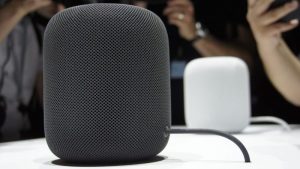By Daniel Salvio

In a world dominated by technology, the brand Apple has become synonymous with sleek designs, intuitive engineering and top of the line quality. In their company’s history, Apple is typically the first or among the first to develop an original take on a product, such as their lines of iPhones, iPad tablets and Mac computers.
However, Apple’s newest product, the Apple HomePod, is relatively late to the game in comparison to the company’s usual standards. It is available for shipping as soon as Feb. 9. Meanwhile, the Amazon Echo has been available to consumers for close to three years. The HomePod is the apple equivalent of the Amazon Echo or Google Home products. It is a smart speaker that responds to prompts and is designed to make everyday life easier and more streamlined.
When the HomePod hits stores early this month, it will boast a hefty $349 price tag, whereas the Echo Dot by Amazon can be acquired for as little as $50 and the Google Home Mini for $39. So is this seven-time mark-up worth it? Apple certainly seems to think so. Based off of the initial reports and specs provided by Apple, the HomePod will have an impressive speaker that is capable of changing its sound levels based on the environment it is placed in.
In a recent review of the three smart speakers (Cortana, Siri and Alexa), Newsweek has noted that the Google Assistant scored best in a general knowledge quiz, with Siri performing the worst. With the power of Google’s search engine behind it, it isn’t all that surprising to see Google Home and Cortana win. Also, considering all of the road bumps and issues Apple has had with Siri across all of the iPhone models, it is somewhat expected that she came in last. Until they are tested and reviewed widely and open to the general public to make their own decisions however, it will be difficult to tell if it really measures up to the other smart speakers or falls flat like Newsweek claims.
Another obstacle that the HomePod will have to overcome if it truly wants to succeed against its massive competitors is its marketing. Personally, I had not seen a single commercial or advertisement for the Apple smart speaker until a few days ago when looking for an Amazon Echo Dot online. The Echo is well known for both its voice and its intelligence. Alexa, has been in dozens of well-known commercials, including one this past weekend during the Super Bowl. When the general public isn’t well-informed on the existence of your product, it is going to be difficult to turn it into a success even with a brand name as big as Apple. One positive thing that the HomePod has that the others do not is a built-in feature to be directly compatible with a subscription to Apple Music for $9.99 a month, that includes up to 45 million different tracks to listen from.
As someone who listens to new music almost daily, this would be somewhat enticing because the other premiere speakers on the market are not made to work with a specific service. In the end though, I do not think that the almost $350 dollar payment for the HomePod is something that I, or many others in the smart speaker market, are willing to comply with for something as simple as Apple Music compatibility or a slightly better speaker. When you can get a comparable product that costs 85 percent less that the HomePod, it becomes very difficult to justify splurging simply because of the Apple logo on the side or the slight advantages it claims to have.
Daniel Salvio, FCRH ’19, is an economics major from Shelton, Connecticut.




































































































































































































